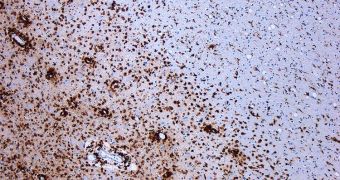A team of scientists at the Northwestern University announces the creation of a drug that addresses the type of brain inflammation characteristic to traumatic brain injury, Parkinson’s disease, Alzheimer's disease, and multiple sclerosis, among several other conditions.
Over the past couple of years, scientists have tried numerous approaches to treating each of these conditions, but thus far with mixed results. Now, experts at the NU Feinberg School of Medicine say they've taken a significant step forward in addressing all of them at once.
A hallmark of all these condition is inflammation of the brain. What the new drug does is reduce this inflammation. In turn, this lessens the severity of symptoms usually caused by a prolonged reaction of the immune system.
Interestingly, the first human Phase 1 clinical trial for the drug has already been completed, after the team that created the medication received patents for the chemicals, and licensed them to a biotech company. This began testing immediately.
It is important to note here that the new class of drugs only targets a specific type of inflammation (neuroinflammation), which occurs in all aforementioned conditions, but also in stroke. Two of the new chemicals are known as MW151 and MW189.
Working together with partners at the University of Kentucky, the Feinberg group demonstrated in the Journal of Neuroscience that mice suffering from early Alzheimer's did not develop the full-blown condition, after receiving one of these drugs.
Scientists engineered these chemicals in a manner that enables the latter to pass through the blood-brain barrier (BBB), a solid line of defense that prevents pathogens from passing from the bloodstream into the brain.
“This could become part of a collection of drugs you could use to prevent the development of Alzheimer’s,” explains D. Martin Watterson, a coauthor of the study, and a professor of molecular pharmacology and biological chemistry at the Feinberg School.
The drugs act quite simply, the group says. Neuroinflammation is triggered when proteins called proinflammatory cytokines are produced in excessive amounts, and MW151 and MW189 prevent this from happening.
“In Alzheimer’s disease, many people now view the progression from mild cognitive impairment to full-blown Alzheimer’s as an indication of malfunctioning synapses, the pathways that allow neurons to talk to each other,” Watterson adds.
“And high levels of proinflammatory cytokines can contribute to synaptic malfunction,” continues the expert, who is also the NU John G. Searle professor of molecular biology and biochemistry.

 14 DAY TRIAL //
14 DAY TRIAL //